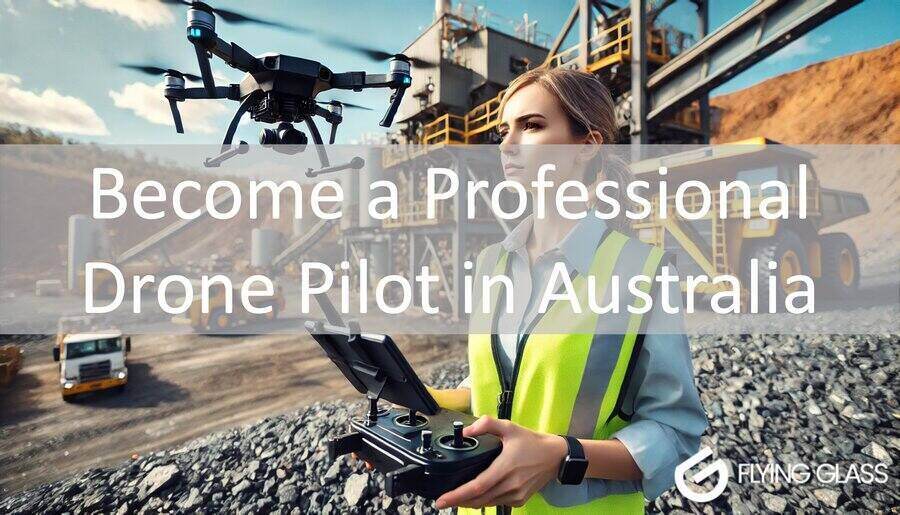How to Become a Professional Drone Pilot in Australia
The demand for professional drone pilots in Australia has soared in recent years. With industries such as media, agriculture, real estate, and construction increasingly relying on drones for everything from aerial photography to surveying, becoming a certified drone pilot can open the door to a wide range of career opportunities.
In this comprehensive guide, we’ll cover the steps required to become a drone pilot in Australia, including the certifications you’ll need, the training involved, and the career paths available to licensed drone pilots. Whether you’re looking to work in the film industry, real estate, or industrial sectors, this guide will provide you with the information you need to get started.

Step 1: Understand the Role of a Drone Pilot
Before diving into the certifications and career paths, it’s important to understand the responsibilities of a professional drone pilot. A drone pilot is responsible for operating remotely piloted aircraft (RPA) for commercial purposes, which can range from aerial photography and cinematography to inspection and surveying.
Key Responsibilities of a Drone Pilot:
- Pre-flight planning and assessing weather conditions
- Operating drones to capture video footage, images, or data
- Ensuring compliance with safety regulations and flight restrictions
- Maintaining and inspecting equipment to ensure it’s in working order
- Navigating the approval process for restricted airspace operations
Becoming a drone pilot involves not just flying, but also understanding the technical, regulatory, and safety aspects of drone operations, particularly in commercial environments.
Step 2: Get Certified as a Drone Pilot in Australia (RePL)
To legally operate drones for commercial purposes in Australia, you need to obtain a Remote Pilot Licence (RePL) from the Civil Aviation Safety Authority (CASA). The RePL certifies that you are qualified to fly drones weighing more than 2 kg and are able to perform complex operations like flying in controlled airspace or beyond visual line of sight (BVLOS).
The Process of Getting an RePL:
- Enroll in a CASA-Accredited Training Course: The first step is to enrol in a CASA-approved course like the one offered by Flying Glass. Our RePL course covers both theory and practical aspects of drone operations, including:
- Basic aviation knowledge
- Meteorology for RPAS operations
- Airspace regulations and aeronautical charts
- Flight planning and risk management
- Practical flying skills at our private field
- Pass the Theory and Practical Exams: After completing the course, you’ll need to pass both a theory exam and a practical assessment. The theory exam covers topics like air law, drone safety, and operational procedures, while the practical assessment tests your ability to operate a drone in real-world conditions.
- Apply for Your RePL with CASA: Once you’ve passed the exams, you can apply for your Remote Pilot Licence through CASA. After approval, you’ll be certified to operate drones commercially in Australia.
AROC and Additional Certifications
In addition to the RePL, most commercial drone pilots will also need an Aeronautical Radio Operator Certificate (AROC), which is required to communicate with air traffic control in certain airspaces. The AROC is typically included in comprehensive training programs like the one offered at Flying Glass.
Step 3: Consider Getting an REOC (Remote Operator’s Certificate)
While an RePL certifies you as an individual pilot, businesses and operators looking to manage more complex drone operations will also need a Remote Operator’s Certificate (REOC). The REOC allows you to manage a fleet of drones and pilots for larger projects, such as aerial inspections, infrastructure monitoring, or large-scale agricultural surveys.
At Flying Glass, we offer consultancy services to help businesses and individuals obtain an REOC, including the development of operations manuals and navigating CASA’s approval processes.
Step 4: Career Paths for Drone Pilots in Australia
Once you’ve obtained your RePL (and potentially an REOC for businesses), a variety of career opportunities will open up. Drones are increasingly being used in industries ranging from media and real estate to agriculture and emergency services.
1. Media and Aerial Cinematography
One of the most exciting career paths for drone pilots is in media and filmmaking. Drones are now essential tools for capturing dynamic aerial shots, and professional pilots are in high demand for television, film, and commercials. At Flying Glass, we specialise in providing drone cinematography services for high-profile productions, working with networks like Netflix, Amazon, and BBC. Our showreel showcases the stunning visuals that can be achieved with skilled drone operation.
2. Real Estate
Drones have transformed the real estate industry by providing agents and developers with aerial views of properties, helping to market listings in a visually appealing way. Drone pilots can work with real estate companies to capture aerial footage of homes, developments, and commercial properties, creating stunning videos and images that enhance property listings.
3. Agriculture
In the agriculture sector, drones are used for precision farming, allowing farmers to monitor crop health, assess soil conditions, and optimise irrigation systems. As an agricultural drone pilot, you can work with farmers to capture aerial data that helps improve yields and manage resources more efficiently.
4. Infrastructure and Construction
The construction industry uses drones for site surveys, inspections, and progress monitoring. Drone pilots can help companies capture data from hard-to-reach areas, ensuring projects stay on track and safety standards are maintained. With the ability to fly in challenging environments, drones offer a safer, more cost-effective alternative to traditional methods.
5. Emergency Services and Disaster Response
Drones are increasingly being used by emergency services for search and rescue missions, disaster response, and fire management. In these roles, drone pilots help emergency teams assess damage, locate missing persons, and monitor wildfire activity from the air, providing critical data in real-time.
Step 5: Average Salary and Potential Earnings for Drone Pilots
One of the key considerations for aspiring drone pilots is the earning potential. The average salary of a drone pilot in Australia can vary depending on the industry, location, and level of expertise.
Average Salary for Drone Pilots in Australia:
- Entry-Level Drone Pilots: Starting salaries for new drone pilots typically range from $50,000 to $70,000 per year, depending on the industry and location.
- Experienced Drone Pilots: With more experience and advanced certifications like an REOC, drone pilots can earn between $80,000 and $120,000 annually.
- Freelance Drone Operators: Freelancers or those who own their drone businesses can charge daily rates of $1,000 to $10,000, depending on the scope of the project.
At Flying Glass, we’ve seen drone pilots thrive across a variety of industries, from media and entertainment to agriculture and infrastructure. With the right certifications and experience, drone pilots in Australia can build lucrative and rewarding careers.
Step 6: Keep Up with Industry Trends and Regulations
The drone industry is constantly evolving, with new technologies and regulations being introduced regularly. To stay competitive, it’s important for drone pilots to keep up with the latest trends and ensure they are compliant with the latest CASA regulations.
Emerging Trends in Drone Technology:
- AI and Automation: AI-powered drones are becoming more common, allowing for autonomous flight and advanced data analysis.
- BVLOS Operations: Flying beyond visual line of sight (BVLOS) is one of the most exciting developments in drone technology, opening up new possibilities for drone pilots in industries like logistics and delivery.
- Environmental Monitoring: Drones are increasingly being used for environmental monitoring, including tracking climate change, wildlife, and forest health.
Conclusion: Start Your Career as a Professional Drone Pilot
Becoming a professional drone pilot in Australia is a rewarding career path with opportunities across various industries. By obtaining the necessary certifications, such as the RePL and REOC, and gaining experience in your chosen field, you can build a successful career in drone operations.
At Flying Glass, we offer top-tier drone operator services, training programs, and consultancy to help aspiring drone pilots navigate the industry. Whether you’re interested in aerial cinematography, real estate, or agriculture, our team is here to support you on your journey. Check out our showreel to see the incredible work we’ve done, and get in touch with us to learn how we can help you take your drone career to the next level.

